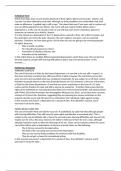INTRODUCTION
Article 5(1) states that ‘no one shall be deprived of their right to liberty and security’. ‘Liberty’ and
‘security’ has been defined by Lady Hale ‘although my living conditions are comfortable, that shall
make no difference. A guided cage is still a cage’. This shows that even if you were not in a prison cell,
you can still be deprived of your liberty. The courts will also need to further define what a
deprivation is, in the case of Guzzadi v Italy we are told that even severe restrictions placed on
someone can amount to an Article 5 breach.
It is only classed as a deprivation if, the V is deprived for a period of time, the V didn’t consent, and
the restrictions are set by the state. However, this can’t apply to everyone, such as convicted
prisoners. Therefore, we have been given a list of when you are not going to be restricting peoples
A5 rights, these are:
- After a lawful conviction
- For educational purposes (a minor)
- Prevention of infectious disease; and
- Protection of the individual
In this Article there are multiple different potential depravations which they cover, this can be from
terrorist suspects, people with learning difficulties to police stop and search powers. In this
scenario…….
POTENTIAL SENARIOS
TERRORIST SUSPECTS
The case of Secretary of State for the Home Department v JJ saw that as he was still a ‘suspect’ as
they have not been convicted, they still have Article 5 rights, however, the restrictions put on him
were too strict and exceeded what was considered reasonable, he was subject to an 18-hour curfew,
limitation to people who he could meet (Potential breach of A11). However, in the case of Secretary
of State for the Home Department v E saw that less severe restrictions in the form of a 12-hour
curfew and the freedom to meet and talk to anyone he wanted to. To further help ensure that the
rights of the individual are not being breached they have removed Control Orders and replaced them
with TPIM’s (Terrorism Prevention and Investigation Measures Act 2011), so far there have not been
a breach of A5 since this, therefore, suggesting they are imposing less severe restrictions on the
suspects. But the courts will still need to try and balance the individuals’ rights against society.
In this scenario was/wasn’t a deprivation for a period of time, they did/didn’t consent, and it
was/wasn’t set by the state…
PEOPLE BEING CARED FOR
The case of Cheshire West and Chester Council v P, established, by Lady Hale that although people
with learning difficulties ‘they still have the same rights and liberties as everybody else’. This is
evident in the case of Hillindon LBC v Neary the son had severe learning difficulties and was put into
respite care for only a few days, however, the father’s child was in there for over a year, although
attempts had been made to allow the discharge of his son. There can be scenarios where the courts
can further define when a deprivation can become a breach these are the following:
- The V did not consent to the deprivation,
- The Next of Kin was doing not consent to the deprivation,
- They are not normal living conditions for someone with that disability,
- They do not get a chance for recreational actives.
In this scenario was/wasn’t a deprivation for a period of time, they did/didn’t consent, and it
was/wasn’t set by the state…




